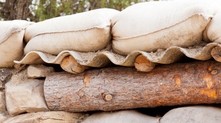 Don't ever argue with anyone in possession of a trenchant wit. You'll come away bloodied and bruised every time. Especially bloodied. Trenchant is a synonym for cutting or sharp, and readers with a sense for these things will have already guessed at its French origins. It's directly related to trench, as in the terrible things that soldiers in WWI suffered and died in. In fact, WWI is when the term trench warfare arose, though oddly enough not until 1918, the last year of the war. Trench coat, also from that war, is named after apparel worn by British officers in the trenches. The Australian term digger also has a place in this story, even though it originated during the 1800s. At that time, it was a popular word on both sides of the Tasman, and referred to someone who worked in a mine or spent their time digging for Kauri gum. It gained an especially strong foothold in Australia thanks to the Victoria Eureka Rebellion of 1854, in which 27 people died during an uprising against gold mining bosses. During WWI, digger earned even greater currency thanks to the fact that Australian soldiers (along with British, New Zealand, etc) did, literally, spend a good part of the war digging. If you ever find yourself wondering what war is good for, one answer is that it seems to throw up new words and phrases, or expand existing ones, thereby enriching the language. WWII gave us blitzkrieg, Vietnam gave us grunt (for soldier), and the second US-Iraq war gave us axis of evil. Some benefit. Other variants of trench are trencher, a board for cutting food, and the little known trencherman, someone with a hearty appetite. Trench is also thought to be related to truncate, or cut short. Those who work in finance may also be familiar with tranche, which literally means portion (usually of money) and is simply a variant of trench. Funny how French sounding words somehow seem more important than the English. I mean, which would you rather be handed: a portion of money or a tranche of funds? Thought so.
0 Comments
Leave a Reply. |
Copyright. 2023 Department of Writing

 RSS Feed
RSS Feed
